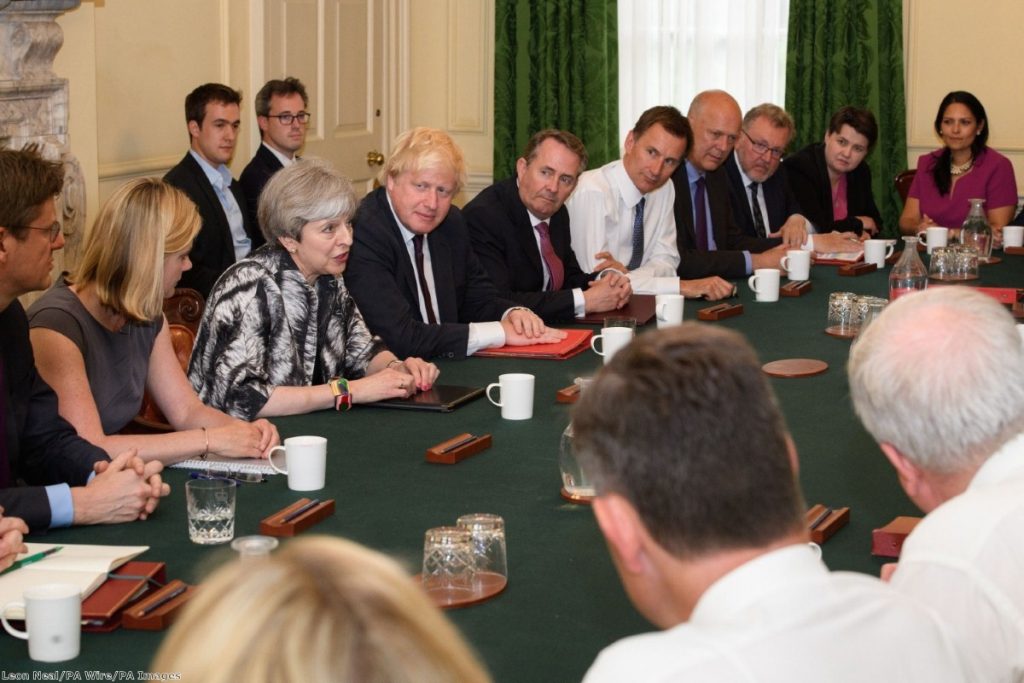The government was defined, as soon as it was created, by survival. Theresa May's deal with the DUP, announced in her first statement after the snap general election, contained the DNA of the entire endeavour: She would do whatever it took to keep the train chugging along. And there was a very good chance that it would be completely inflexible and unimaginative.
This week's resignation of Michael Fallon was a major chapter in that same story. Ostensibly, the defence secretary stood down because he touched a woman's knee 15 years ago, but no-one believes that. Clearly there are other stories bubbling under the surface. Fallon was the attack dog with a black-tie collar. He'd be the one sent out to say Ed Miliband stabbed his brother in the back, or to associate Sadiq Khan with extremism, while sounding posh and reserved enough to make it appear respectable. Now it turns out he's probably not such a lovely guy. You'd never have known.
Stories float around Westminster concerning other figures in government and plenty on the backbenchers – some very minor, some serious. It's possible this will turn into an equivalent of the expenses scandal, a widespread long-running story which claims several scalps. If so May seems strategically ill-suited to dealing with it, as her promotion of Gavin Williamson to the defence role from the whips' office proved.
This was an opportunity to do a reshuffle, refresh the front bench team and try to get out ahead of the story. She could credibly present herself as the prime minister to drain the sexual harassment swamp. She's a woman, she has a good record of kicking the hell out of complacent male-dominated institutions. You can see the dots from which a picture could be drawn. Instead she was timid, uninspired and did the absolute minimum necessary to, once again, keep the train chugging along.


New UK Defence Secretary Gavin Williamson arrives at Ministry of Defence as he takes over from Sir Michael Fallon https://t.co/kxlpCHbRMY pic.twitter.com/tFjL9UAceG
— BBC News (UK) (@BBCNews) November 2, 2017
But the decision didn't work on its own terms. The Williamson selection proved crazily unpopular in the parliamentary Conservative party and lost her precious remaining strands of support. Not only that, but it promoted someone working in an office which is itself under scrutiny for possibly sitting on allegations in order to enforce discipline.
Williamson's great initiative in the whips' office was to have the government utterly capitulate in opposition day motions rather than risk losing them. This might make some sort of basic day-to-day sense. By not taking part you haven't lost each instance. You work to make the whole idea of opposition day motions as meaningless as possible. But there is a greater loss, a loss of authority or respectability, a loss of courage. And, of course, there is the loss to British democracy, even if that is not something which preoccupies the whip's office.
The tactic was on show again this Wednesday when the whips realised they couldn't win the vote to prevent the release of the Brexit impact papers. The government buckled entirely and refused to fight. Then they fought a series of rearguard defences. They suggested it was non-binding. Then they suggested they could delay publication. Then they suggested they could redact it. And then finally, as tragedy turned to farce, they were reduced to claiming they weren't impact papers at all. At each stage, they gave in as little as possible in a desperate bid to keep the train chugging along.
In each aspect of government activity you see the same attribute: the requirement of survival above all else. This is, after all, the attribute the Conservative party is most famous for.
And yet overshadowing it all is Brexit: a policy which will tear the Conservative party apart. It is a bitter irony that the only aim of a government defined by survival is to enact something which makes it impossible.
Ian Dunt is the editor of Politics.co.uk. The new edition of his book – Brexit: What The Hell Happens Now? – is available to pre-order now.
The opinions in politics.co.uk's Comment and Analysis section are those of the author and are no reflection of the views of the website or its owners.









